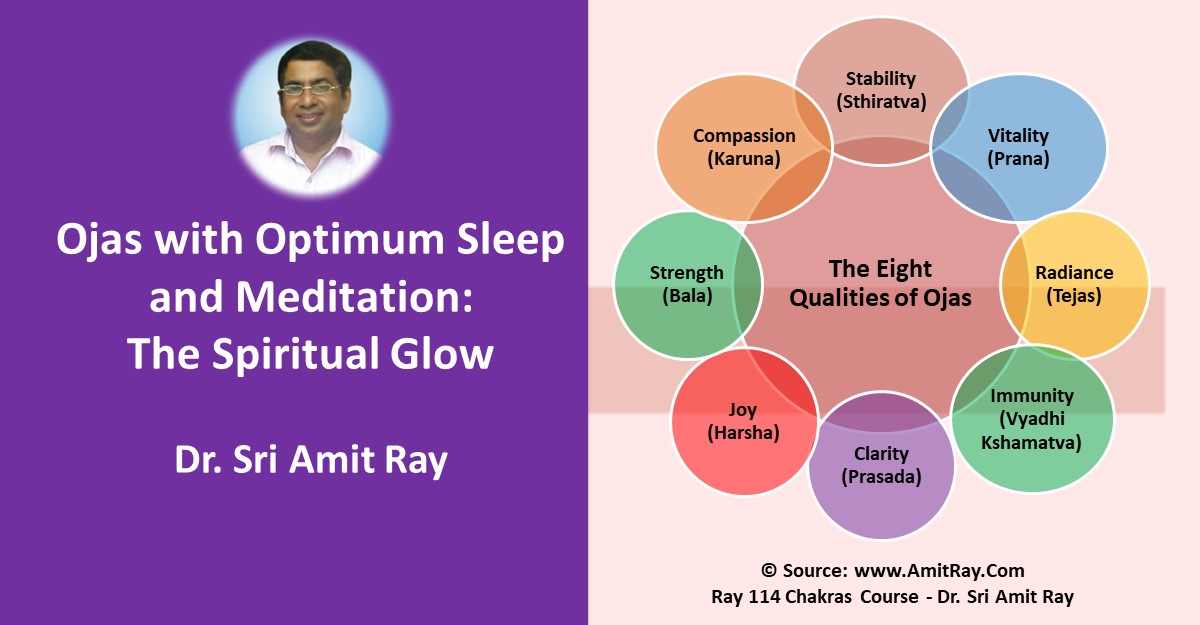In Ayurveda, ojas is revered as the essence of vitality, strength, resilience, spirituality, and overall well-being. It is the culmination of the body’s metabolic processes and reflects the harmony between the physical, mental, and spiritual dimensions of life. Among the various factors that influence ojas, sleep stands out as one of the most critical.
You can increase your ojas through practices such as a balanced diet, the use of herbs, adequate sleep, yoga exercises, balancing your 114 chakras, and maintaining positive thoughts and emotions. Here, we will discuss how to increase your ojas by optimizing sleep timing, quality, and quantity.

This article explores the intricate relationship between ojas and sleep, meditation, covering aspects such as sleep timings, quality, quantity, and the underlying neuroscience and hormonal mechanisms.
“To enhance ojas, prioritize quality sleep, harness the healing power of herbs, and harmonize your 114 chakras with the cosmic divinity.” – Sri Amit Ray
There are two types of ojas: para (supreme) and apara (ordinary). Para ojas is considered the highest form; it gives the spiritual awakening, while apara ojas is more dispersed throughout the body. Apara Ojas gives vitality, strength, and resilience.
What is Ojas?
Ojas is a concept in Ayurveda and yogic tradition, referring to the subtle essence of vitality and life energy. It is considered the foundation of physical, mental, and spiritual well-being. Ojas is believed to be the essence that maintains immunity, strength, happiness, and emotional resilience.
The Concept of Ojas in Ayurveda
In Ayurveda, ojas is viewed as the essence of vitality and immunity. It is believed to be derived from the digestion of food and experiences, representing the body’s highest energy state. Ojas is classified into two types: para (supreme) and apara (ordinary). Para ojas is considered the highest form, residing in the heart, while apara ojas is more dispersed throughout the body. Ojas is called as maha dhatu. It is the essence of all the seven dhatus [1].
Ojas is thought to be responsible for maintaining physical strength, mental clarity, emotional balance, and overall resilience. Its depletion can lead to fatigue, weakened immunity, and a diminished sense of well-being. Thus, cultivating and preserving ojas is essential for holistic health.
Eight Qualities of Ojas:
- Stability (Sthiratva): Ojas provides physical and mental stability, grounding the body and mind, and promoting resilience against stress.
- Vitality (Prana): Ojas enhances vitality and energy levels, ensuring the body functions optimally and the mind remains alert.
- Radiance (Tejas): Ojas imparts a natural glow to the skin and a sparkle in the eyes, reflecting inner health and well-being.
- Immunity (Vyadhi Kshamatva): Ojas strengthens the immune system, making the body more resistant to illnesses and infections.
- Clarity (Prasada): Ojas supports mental clarity, emotional balance, and a positive outlook on life.
- Joy (Harsha): Ojas is associated with a deep sense of contentment, joy, and emotional resilience.
- Strength (Bala): Ojas provides physical strength, endurance, and the capacity to withstand physical challenges.
- Compassion (Karuna): Ojas fosters a sense of love, compassion, and connection with others, promoting harmonious relationships.
These qualities of Ojas are essential for achieving and maintaining holistic health, vitality, and spiritual fulfillment.
The Role of Sleep in Ayurveda
Ayurveda places significant emphasis on sleep (Nidra) as one of the three pillars of health, alongside diet (Ahara) and balanced lifestyle (Brahmacharya). According to Ayurvedic principles, proper sleep is essential for maintaining and enhancing ojas. Sleep allows the body and mind to rejuvenate, ensuring that the metabolic processes leading to the production of ojas function optimally.
Sleep Timings and Their Impact on Ojas
The timing of sleep plays a crucial role in maintaining ojas. Ayurveda suggests that the best time to sleep is during the Kapha period of the evening, which typically begins around 6 PM and ends around 10 PM. Sleeping during this time is believed to enhance the quality of sleep, thereby positively influencing ojas.
1. Early Bedtime and Ojas
Going to bed early, ideally by 10 PM, aligns with the body’s natural circadian rhythms. This practice supports the body’s ability to detoxify and repair itself during the night, leading to the optimal production of ojas. Early sleep allows for a deeper and more restorative sleep cycle, which is crucial for the replenishment of ojas.
2. Late-Night Sleep and Its Effects on Ojas
Conversely, staying up late disrupts the natural sleep cycle and can deplete ojas. The Pitta period (10 PM to 2 AM) is associated with the body’s metabolic activities. If one remains awake during this time, the body’s energy is diverted from its natural detoxification and healing processes, leading to a decline in ojas over time.
Quality of Sleep and Ojas
The quality of sleep is perhaps more important than the quantity when it comes to maintaining ojas. High-quality sleep involves reaching the deeper stages of sleep, where the body undergoes significant repair and rejuvenation processes.
1. Deep Sleep and Ojas
Deep sleep (also known as slow-wave sleep) is the stage where the body undergoes profound physiological changes, including the repair of tissues, strengthening of the immune system, and release of growth hormones. This stage is critical for the production and maintenance of ojas. During deep sleep, the body’s energy reserves are replenished, contributing to the overall vitality and resilience that ojas represents.
2. Disrupted Sleep and Its Impact on Ojas
Disrupted sleep, characterized by frequent awakenings or an inability to enter deep sleep, can have a detrimental effect on ojas. Poor sleep quality leads to a lack of proper physical and mental rejuvenation, resulting in fatigue, irritability, and a weakened immune system—all signs of diminished ojas.
Quantity of Sleep and Its Relationship with Ojas
While the quality of sleep is paramount, the quantity of sleep also plays a vital role in maintaining ojas. Ayurveda traditionally recommends 7 to 8 hours of sleep for most adults, although individual needs may vary based on age, constitution, and lifestyle.
1. Adequate Sleep and Ojas
Getting enough sleep is essential for allowing the body to complete its restorative processes. Adequate sleep ensures that all stages of sleep—light sleep, deep sleep, and REM sleep—are properly experienced, contributing to the holistic production of ojas. Sufficient sleep supports cognitive function, emotional balance, and physical health, all of which are reflections of strong ojas.
2. Sleep Deprivation and Its Effects on Ojas
Chronic sleep deprivation leads to a significant reduction in ojas. Lack of sleep impairs cognitive functions, increases stress levels, and weakens the immune system. Over time, this can manifest as chronic fatigue, anxiety, and various health issues, indicating a severe depletion of ojas.
The Neuroscience of Sleep and Ojas
Recent advancements in neuroscience provide a deeper understanding of how sleep influences the production and maintenance of ojas. Sleep plays a crucial role in brain function, memory consolidation, and emotional regulation, all of which are vital for maintaining high levels of ojas.
1. Brain Function and Ojas
During sleep, the brain undergoes various restorative processes, including the clearance of metabolic waste products through the glymphatic system. This process is essential for maintaining cognitive function and mental clarity, both of which are key components of ojas. Additionally, sleep supports neuroplasticity, the brain’s ability to adapt and reorganize itself, which contributes to overall mental resilience.
2. Emotional Regulation and Ojas
Ojas is vital for emotional intelligence, and emotional regulation. The connection between sleep and emotional regulation is well-established in neuroscience. Proper sleep helps regulate the production of neurotransmitters such as serotonin and dopamine, which influence mood, stress levels, and overall emotional stability. A well-balanced emotional state is a sign of healthy ojas, while emotional instability can indicate ojas depletion.
Hormonal Regulation, Sleep, and Ojas
Hormones play a critical role in regulating sleep and, by extension, the production and maintenance of ojas. Several hormones are involved in the sleep-wake cycle, and their balance is crucial for sustaining ojas.
1. Melatonin and Ojas
Melatonin is a hormone that regulates the sleep-wake cycle. It is produced in the pineal gland and is released in response to darkness. Melatonin not only facilitates sleep but also has antioxidant properties that protect cells from damage, thereby supporting the production of ojas. Adequate melatonin levels are essential for maintaining high-quality sleep and, consequently, optimal ojas levels.
2. Cortisol and Ojas
Cortisol is a stress hormone that follows a diurnal rhythm, with levels peaking in the early morning and gradually declining throughout the day. Chronic stress can lead to elevated cortisol levels, which can disrupt sleep and negatively impact ojas. High cortisol levels at night can prevent deep sleep, leading to poor quality sleep and a decline in ojas.
3. Growth Hormone and Ojas
Growth hormone is released during deep sleep and plays a vital role in tissue repair, muscle growth, and immune function—all essential components of ojas. Sufficient deep sleep is necessary for the optimal release of growth hormone, contributing to the overall vitality and strength that ojas represents.
Neurotransmitters and Ojas
When neurotransmitter levels are balanced, they support a healthy mind and body, fostering the optimal production and maintenance of ojas. In contrast, imbalances in neurotransmitters can lead to conditions like anxiety, depression, or chronic stress, which deplete ojas. Ayurveda suggests that emotional and mental stability is crucial for preserving ojas, and similarly, neurotransmitter balance is essential for maintaining emotional well-being.
Dopamine and serotonin play significant roles in cognitive function and mental clarity. High levels of these neurotransmitters support concentration, motivation, and mental agility. These qualities reflect a strong and vibrant ojas. Conversely, low levels can result in cognitive decline and diminished vitality.
Meditation to Enhance Ojas
Ojas is not just physical vitality but also spiritual energy. Meditation deepens spiritual awareness, connecting the individual to their higher self and the universe. This spiritual connection strengthens Ojas, as it aligns the individual with the natural rhythms and energies of life, fostering a deep sense of purpose, contentment, and inner strength.
Meditation activates the parasympathetic nervous system, often referred to as the “rest and digest” system. This state of relaxation and balance promotes optimal digestion and metabolism, which are crucial for the production of high-quality Ojas. A balanced 114 chakra system also means better sleep, reduced anxiety, and a more harmonious flow of energy, all contributing to the enhancement of Ojas.
Meditation is a powerful tool for enhancing Ojas. By calming the mind, balancing the nervous system, cultivating positive emotions, and deepening spiritual awareness, meditation supports the production, preservation, and flourishing of Ojas. This, in turn, leads to a state of optimal health, vitality, and spiritual well-being.
Ayurveda Practices to Enhance Ojas
In Ayurveda, Sapta Dhatus (सप्त धातु) refers to the seven fundamental tissues that constitute the human body. These dhatus play a critical role in maintaining the body’s structure, function, and vitality. Ojas (ओजस्) is considered the essence of all these dhatus and is vital for overall health, immunity, and vitality.
To increase ojas, Ayurveda advocates the adherence to concepts like dina charya, ritu charya, sadvritta, and Na vega dharan. These contribute to overall health and vitality:
- Dina Charya (दिनचर्या) – Daily Routine: Following a balanced and disciplined daily routine helps in harmonizing the body’s natural rhythms with the cycles of nature. This includes practices such as waking up early, cleansing, meditation, yoga, proper diet, and adequate rest.
- Ritu Charya (ऋतुचर्या) – Seasonal Regimen: Aligning one’s lifestyle and diet with the changing seasons is crucial in maintaining balance and preventing disease. Ayurveda emphasizes adjusting your diet, clothing, activities, and even mental attitudes according to the season to preserve ojas and overall health.
- Sadvritta (सद्वृत्त) – Right Conduct: Living a life of moral integrity, practicing non-violence, truthfulness, and compassion, and maintaining positive thoughts and emotions all contribute to the cultivation of ojas. Sadvritta involves ethical living and nurturing good habits, which are essential for mental and physical well-being.
- Na Vega Dharana (न वेगधारण) – Not Suppressing Natural Urges: Ayurveda advises against suppressing natural bodily urges like hunger, thirst, sleep, and the urge to urinate or defecate. Suppression of these urges can lead to imbalances and diseases, which deplete ojas. Allowing the body to follow its natural rhythms and processes is vital for maintaining ojas.
By incorporating these Ayurvedic principles into daily life, one can effectively nurture and increase ojas, leading to enhanced vitality, immunity, and overall well-being.
Conclusion
The relationship between ojas and sleep is deeply intertwined, with sleep playing a critical role in the production, maintenance, and enhancement of ojas. By adhering to proper sleep timings, ensuring high-quality sleep, and getting adequate rest, individuals can support their ojas and, by extension, their overall vitality and well-being.
Understanding the neuroscience and hormonal regulation of sleep further highlights the importance of restful sleep in maintaining ojas. By nurturing both the physical and mental aspects of sleep, one can enhance ojas, leading to a more vibrant, resilient, and spiritually connected life. Embracing the Ayurvedic wisdom of ojas and its connection to sleep can guide us toward a healthier, more balanced existence.




